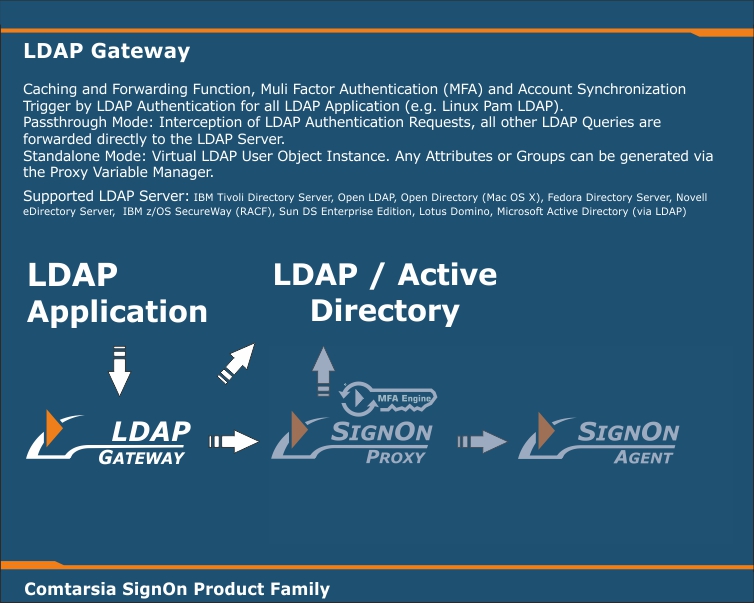Virtual LDAP Directory
The LDAP Gateway provides a virtual LDAP directory for LDAP clients.
Bridge the Gap Between Applications and Your Auth System
Many applications and systems require LDAP connectivity, but your authentication system might use different protocols or storage methods.
The LDAP Gateway, in Standalone Mode, provides a virtual LDAP Server for LDAP authentication clients, using any LDAP directory or Microsoft Active Directory domain as the basis for managing users and passwords. Logon rules can be controlled via LDAP or AD attributes and groups. This approach also makes powerful SignOn Proxy functionalities, such as multi-factor authentication or synchronization requests for agents, available to all your LDAP clients.
The Integration Challenge
- Protocol Incompatibility: Applications need LDAP, but your user store is in a database, cloud service, or proprietary system.
- Expensive Migration: Moving your entire authentication system to LDAP just to satisfy application requirements.
- Data Duplication: Maintaining user information in multiple systems, leading to synchronization issues and inconsistencies.
The Virtual LDAP Advantage
- Universal LDAP Interface: Instantly expose any authentication backend as a standards-compliant LDAPv3 directory.
- Native MFA Integration: Add FIDO2, Smart Cards, TOTP/HOTP, and COTP capabilities to any authentication system.
- Keep Your Current System: No migration required - your existing authentication infrastructure remains unchanged.
Your Virtual LDAP Directory
The SignOn Proxy acts as a complete LDAP directory server, translating queries and authentication requests to your backend system while providing full LDAPv3 compliance.
Core Capabilities:
- Full LDAPv3 Support: Complete implementation of LDAP protocol including search, bind, and directory tree operations.
- Backend Flexibility: Connect to databases, REST APIs, custom authentication modules, or transform non-LDAP directories.
- Performance & Caching: Built-in authentication caching and high-availability deployment for enterprise environments.

Perfect for Any LDAP Integration
Enable LDAP connectivity for applications and systems without changing your backend.
Database Integration
Expose user data stored in SQL databases as LDAP directory for legacy and modern applications.
Cloud Services
Bridge cloud identity providers and SaaS user stores to on-premise LDAP-dependent applications.
Linux Systems
Enable LDAP authentication for Linux servers with PAM and NSS integration from any backend.
Legacy Applications
Modernize legacy application authentication without code changes by providing LDAP interface.
Enterprise-Grade LDAP Features
Complete LDAP functionality with modern security enhancements.
LDAPv3 Compliance
Full standards compliance for maximum application compatibility.
LDAPS & StartTLS
Secure LDAP communications with TLS encryption support.
High Performance
Built-in caching and optimized queries for enterprise scale.
Multi-Factor Authentication
Native FIDO2, Smart Card, TOTP, and COTP support.
Flexible Configuration
Customize directory tree structure and attribute mapping.
High Availability
Deploy multiple instances for load balancing and failover.
Powered by SignOn Proxy
This Virtual LDAP solution is built on our flexible and robust authentication platform.
SignOn Proxy
The central authentication hub that transforms any backend into a complete LDAP directory service. Configure virtual LDAP mode to expose your authentication system with full LDAPv3 compliance and MFA capabilities.
Learn MoreEnable LDAP Connectivity from Any Authentication System
Ready to provide LDAP compatibility without changing your backend infrastructure? Contact us to discover how Virtual LDAP can bridge your applications and authentication systems.
